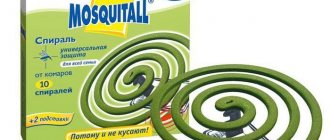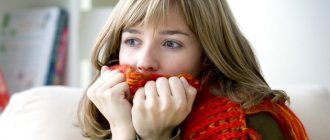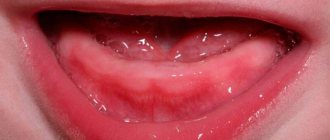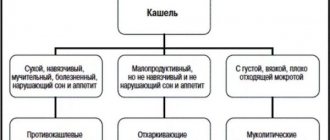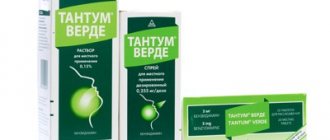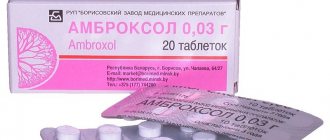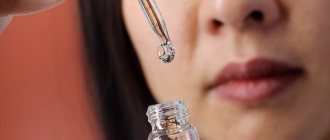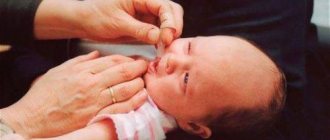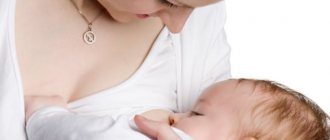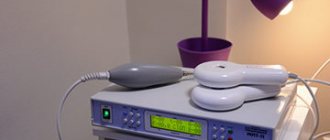It often happens that a child is too active during the day, is easily excitable and has difficulty falling asleep in the evening. The problem of falling asleep easily is exacerbated by restless, shallow sleep during the night. This is painful not only for the baby, but also for his parents.
Sometimes, involuntarily, there is a desire to give him sleeping pills. But sleeping pills for children can lead to lethargy in the morning and hyperactivity in the evening, aggravating the situation.
Glycine
Cost No. 50 – 49 rubles.
Glycine is a simple amino acid; its role is to regulate inhibitory processes in the cerebral cortex. The effect of glycine is complex and complex: it should be used not only for sleep disorders. To improve sleep, it is absorbed under the tongue, since absorption into the sublingual vessels avoids passage through the liver portal system, which accelerates the effect.
Advantages: Since glycine (aminoacetic acid) is found in sufficient quantities in the human body, an overdose of glycine is unlikely to occur before serious complications occur. In addition, the drug has an anti-anxiety effect and simultaneously improves memory and memorization processes. It is used in therapy, neurology, and is widely prescribed to school-age children.
Disadvantages: the specific hypnotic effect of glycine has not been studied separately. The effect of the drug is reduced to restoring the imbalance between the transmitters of the sympathetic and parasympathetic parts of the autonomic nervous system.
From reviews of Glycine: “I started using glycine on the advice of friends during a session, as I had previously abused coffee in order to remember a large amount of information. I started having breakdowns, memory impairment, irritability and poor sleep. A week after starting to take glycine, I managed to get rid of all the unpleasant sensations. Improved sleep and memory.”
The main causes of crying in newborns
Sleep disturbances can be caused by psychological and physiological reasons:
- If the child is naturally a “little sleeper.” In this case, frequent awakenings may be a feature of the baby’s character and temperament.
- If the child has age-related psychological difficulties. He began to have scary dreams due to the active development of his imagination; he has age-related crises (3 years, 7 years, adolescence)
- If there is a difficult atmosphere in the family, quarrels, conflicts, or the child has experienced severe stress.
- If the child is in pain. Sleeping pills will not have any effect in this case.
In these cases, the child does not need sedatives (hypnotics). He will benefit from the help of a psychologist, confidential communication with parents, and play therapy. In case of pain, you need to consult a doctor and treat the cause, not the effect.
Sleep disorders in children and adolescents can also have other origins:
- Shallow, restless sleep, awakening accompanied by shrill crying. These signs may indicate damage to the child's nervous system.
- Night shudders are a very warning sign. This may be the first “bell” in the event of the onset of epilepsy. The child urgently requires examination.
- Somnambulism. Or as we call it, sleepwalking. This is a sleep disorder that is painful in nature. The child can walk, talk, do something without waking up.
- Bedwetting – enuresis. A wet bed does not promote sound sleep for a child.
- Sleep apnea. The child breathes unevenly during sleep, sometimes breathing is interrupted.
- Sleep phase disorder syndromes. This is a “failure” of the child’s internal clock. He may be sleepy during the day and awake at night. In infants, the biological clock is restored independently or with the help of parents. And in older children, sleep phase disorder syndromes may also require drug treatment.
Crying is the only way a baby gets attention and communicates with the world. Therefore, there can be many reasons for screaming
They can be divided into several groups:
- hunger is the most common and simple reason;
- inconvenience, discomfort - a dirty diaper, uncomfortable position or clothing, bright or weak light, noise, cold or overheating;
- fear;
- pain – there are many reasons: from colic to serious diseases.
Infants often cry from overwork, fatigue, and inability to relax and fall asleep. The desire to be held is associated with the memory of the warmth and comfort of intrauterine life.
Important: you need to look for sedatives for newborns after excluding dangerous causes of anxiety - serious digestive problems, central nervous system, pain caused by organic or functional lesions that require treatment. From six months of age, Hipp with natural herbs, Hipp apple tea with lemon balm, Hipp good night are recommended
Among the domestic teas, “Calming Children's” and “Evening Tale” are suitable. The instructions for such safe parental assistants contain detailed descriptions of how to use them. You can give your child teas after stress and at night
From the age of six months, Hipp with natural herbs, Hipp apple tea with lemon balm, Hipp good night are recommended. Among the domestic teas, “Calming Children's” and “Evening Tale” are suitable. The instructions for such safe parental assistants contain detailed descriptions of how to use them. You can give your child teas after stress and at night.
If a mother is breastfeeding, then she herself can drink herbs with a sedative effect with a sedative effect, thus calming the child. You just need to know their features. For example, motherwort infusion reduces blood pressure, and if a woman has low blood pressure, then it is better to give preference to lemon balm or lavender. For children up to one year old, you can make infusions of fennel, valerian, and hops.
The best option to avoid looking for a sedative after stress is to protect your child from being among a large crowd of strangers or a new turbulent environment. Sometimes even large toys given to a baby can lead to severe fright.
An increasing number of modern children are faced with neuroses. Doctors note the most important risk factor is the pathology of pregnancy and the birth process, namely hypoxia. It affects the nervous tissue of the fetus or a newborn child, causing increased excitability, emotional instability, leading to other neurotic problems in the baby.
Neurosis has predisposing factors:
- heredity (diseases of the nervous system in parents);
- constant emotional stress;
- traumatic situations experienced by the child (attack, violence, disaster, road accident, etc.).
Causes of sleep disorders in children
Deviations in the duration and structure of sleep in children are usually based not on pathology, but on physiological patterns and psychological characteristics of age.
- The child basically sleeps little. Then the choleric temperament or the anxious nature of the baby is “to blame” for the frequent wake-ups.
- There are psychological difficulties associated with age.
- The child has nightmares due to violent imagination, he goes through an age crisis of three or seven years or a crisis of adolescence.
- The situation in the family is difficult: loved ones are in conflict, the child is experiencing enormous stress.
- Any physical sensation is bothering you, there is an illness present. Taking sleeping pills against the background of the disease will not have an effect.
Sleep phase disorder syndromes
They manifest themselves as problems with the biorhythms of the child’s body. The baby doesn't sleep until 3 o'clock in the morning, and during the day you won't wake him up until lunch. If we are talking about a baby under one year old, then his internal clock returns to normal after some time on its own.
Sometimes parental intervention is required to comply with the regime. Older children may need medication (hypnotics). Without medication support, sleep disorders are quite difficult to eliminate.
Sleep disorders and disturbances in its structure have many causes
Effective and safe sleeping pills
For children who are very restless, baths and teas can only have a temporary effect. In some cases it is impossible to do without medication. There are a huge number of sedatives that are suitable for children under one year old.
They have virtually no contraindications, but they should still be taken with caution. You can purchase medications only on the recommendation of a doctor. a sedative may be used for infants
“Glycine”, “Pantogam”, “Phenibut” - this is an incomplete list of drugs that can be used to eliminate anxiety in infants. Homeopathic remedies also give good results (preparations “Notta”, “Dormikind”, “Hare”, “Viburkol”). They are harmless and gently soothe the baby. But such medications should be used only after consultation with the pediatrician.
a sedative may be used for infants. “Glycine”, “Pantogam”, “Phenibut” - this is an incomplete list of drugs that can be used to eliminate anxiety in infants. Homeopathic remedies also give good results (preparations “Notta”, “Dormikind”, “Hare”, “Viburkol”). They are harmless and gently soothe the baby. But such medications should be used only after consultation with the pediatrician.
Sleeping pills are prescribed to a child only if non-drug methods for normalizing sleep have not yielded positive results. The selection of effective and safe products for newborns or children under 3 years of age is based on their individual characteristics and the presence of sleep problems.
To reduce the likelihood of sleep problems occurring when taking sleeping pills, parents need to follow all the recommendations given in the list:
- Take medications only before bedtime;
- follow the dosage prescribed by the doctor;
- discontinue medications gradually so as not to provoke a recurrence of insomnia;
- Consult your doctor if any side effects occur.
Sleeping pills for newborns are prescribed by a neurologist only if the baby has serious problems with sleep. The following medications can be used to treat newborns:
- Phenibut. The active component is gamma-amino-beta-phenylbutyric acid. The product allows you to increase the duration of sleep. It is considered a mild sleeping pill that does not adversely affect the nervous system.
- Dormikind. The active ingredients are magnesium carbonate and zinc valerian. The drug is prescribed for increased nervous excitability. The drug is prescribed from 1 day of life to 6 years.
- Magne B6. Prescribed for a lack of magnesium in the body. Can be used to treat children of all ages.
- Pantogam. The drug is prescribed from the age of one month. It has a beneficial effect on the nervous system, cerebral blood supply, muscle tone, and quality of sleep.
If taking these medications causes a deterioration in the baby’s well-being, he should be shown to doctors.
All of the above medications can be used to treat sleep problems in children under one year of age. Infants may also be prescribed Hare syrup. This medicine belongs to the group of herbal drugs, which is why it does not have a depressing effect on the central nervous system. For children one year of age, such syrup is often prescribed as a dietary supplement.
Before the age of 3 years, babies often develop calcium deficiency. Its lack provokes the development of sleep disorders and nervous breakdowns. If a child begins to have hysterics at the age of 2, parents should immediately consult a doctor. To reduce the risk of neurological disorders in children, the following medications are prescribed:
- Viburkol - characterized by an active calming effect due to the presence of chamomile and belladonna in the composition;
- Notta is a homeopathic remedy that contains chamomile, oats, zinc valerianate;
- Glycine has a wide spectrum of effects: normalizes sleep, calms the nervous system, and normalizes metabolic processes.
Use sleeping pills for children 2 years of age only as directed by a specialist. If any side effects occur during treatment, the treatment method should be urgently adjusted.
The most commonly prescribed drugs are:
- from 3 years - Tanoten;
- from 5 years - Atomoxetine;
- from 6 years old - Sanosan;
- from 7 years old - Alora.
For older children, Persen is recommended. The optimal age for use is from 12 years.
In what cases is the use of sleeping pills justified?
Any products that improve the quality of night's rest - no matter what age they are intended for children, and what is included in their composition - cannot be purchased for a child on their own, without consulting a doctor.
This is the first and most important rule that parents whose babies sleep restlessly at night need to remember. Especially when you consider that children's sleeping pills, even on a natural basis, are prescribed only as a last resort, when sleep problems are really serious.
Unfortunately, there are many reasons why babies cannot fall asleep in the evening or wake up frequently during the night. Sometimes we are talking about harmless things that can be easily eliminated without the help of doctors and drug treatment, for example, too high an air temperature in the nursery, excessive humidity, a feeling of hunger or thirst, uncomfortable clothes, a warm blanket or wet diapers. Also, the daytime and nighttime rest of babies suffers during teething, during allergies or colds. But even in these cases, insomnia quickly passes as soon as the underlying disease can be overcome.
Psychological factors also influence the quality of sleep, starting from the first crisis at the age of 3, adaptation to kindergarten or school, and ending with teenage love. But no matter how serious the problems, pediatricians, psychologists, and neurologists are extremely reluctant to prescribe sleeping pills for children, even the most natural and light ones. Firstly, taking any drugs of this kind is fraught with daytime lethargy and apathy, as well as a shift in the natural cycles of sleep and wakefulness and the emergence of addiction. Therefore, after contacting an experienced specialist with complaints about problems with a child’s night rest, parents will never be advised to buy a sleeping pill for their child without a thorough examination and diagnosis. It is quite possible that, having understood the causes of insomnia, the doctor, instead of drug treatment, will recommend buying the baby a new crib, reviewing the diet, or establishing emotional contact with mom and dad.
Maybe it's time to just buy a new crib?
So can children be given sleeping pills at all, and if so, in what cases? For newborns and babies under one year of age, drugs of this kind are prescribed for hydrocephalus of the brain or postnatal encephalopathy, that is, only in case of serious damage to the central nervous system. If these pathologies have not been identified, at this age pediatricians do not recommend taking even herbal and homeopathic medicines.
For children from one to three years old, sedatives are prescribed more often, but only if the child has been given one of the diagnoses that implies serious sleep problems. For example:
- ADHD (attention deficit hyperactivity disorder);
- diseases of the nervous system, accompanied by night terrors, somnambulism, nightmares, enuresis, etc.;
- neurosis;
- epilepsy;
- panic or anxiety disorders.
Sedatives for children over 3 years of age also remain a last resort, but in some cases it is quite difficult to do without them. At this age, children, as a rule, begin a more active social life: they go to kindergarten for the first time, meet teachers and a new team, attend clubs or developmental classes. Such a number of new impressions often affects their emotional state - children become whiny, capricious, experience constant stress and nervous strain, quickly get tired and feel unwell. Of course, this cannot but affect the quality of night's rest, and constant lack of sleep, in turn, only aggravates the situation. If in such a situation the doctor comes to the conclusion that the baby needs more serious help than, for example, sea salt baths or herbal infusions, he may prescribe one of the drugs with a calming and hypnotic effect to make it easier for the child to adapt to a new lifestyle.
There are similar reasons for prescribing sleeping pills to newly graduated schoolchildren. The beginning of training, the increasing workload every day and a new large team, which is simply not possible for everyone to join, sometimes require more strength from the child than is at his disposal. This results in an unstable emotional state, restless sleep and nightmares, which are not always possible to cope with without taking medications. And with the onset of adolescence, the situation sometimes worsens to the limit. Therefore, in order to curb the hormonal storms raging in the body of a teenager, parents often turn to doctors with a request to recommend a safe sedative that can return the child to a good mood and sound sleep.
As school starts, stress may increase and, accordingly, sleep problems may appear.
At this age, the list of approved drugs becomes much wider, but they must be selected no less carefully, based on the individual characteristics of the teenager and the nature of his problems. For example, in case of an unstable psycho-emotional state, a plant-based sedative is sufficient; sleep disturbances caused by hormonal imbalances are best eliminated with the help of medications containing melatonin, and nervous overexcitation provoked by prolonged stress requires the use of homeopathic remedies. In addition, if a teenager has been diagnosed with depression accompanied by insomnia, it is possible that he will need light tranquilizers, the use of which is acceptable at this age.
Novo – Passit
Herbal preparation (valerian, lemon balm, elderberry, passionflower, St. John's wort, hawthorn, hops, guaifenzin). Available in tablet and syrup form.
The cost of tablets No. 30 is 600 rubles, syrup (200 ml) is 330 rubles.
Combined herbal preparation with a pronounced sedative effect. Guaifenzine has an additional anti-anxiety effect, which in total allows the drug to be used for the treatment of sleep disorders.
Advantages: has a quick effect. For insomnia disorders, it is recommended to use syrup, which acts even faster. The drug can be used without a course of treatment: the effect of the first dose is quite pronounced.
Flaws:
- Daytime drowsiness and a feeling of depression may develop, especially with an overdose.
- Contraindicated for children.
- Not recommended for use in patients with chronic alcoholism.
From reviews of Novo-Passit: “It’s very good that the drug is of natural origin. A pleasant surprise was that in addition to improving sleep, Novo-Passit helped eliminate anxiety, some kind of nervousness, and alleviated headaches caused by sitting at the computer.”
Contraindications and negative consequences of taking sleeping pills
When prescribing sleeping pills for a child, the pediatrician must take into account contraindications. Medicines of this group are not used in the treatment of children with a history of decompensated diseases of the heart, kidneys, liver and blood vessels, or severe forms of allergies.
Despite the fact that the minimum dose of the drug is always prescribed, side effects are difficult to avoid. In childhood, the following undesirable symptoms appear:
- constipation/diarrhea,
- dry mouth / constant thirst,
- nausea or vomiting
- headache,
- weakness,
- muscle spasms/cramps,
- dizziness,
- impaired concentration,
- dyspeptic disorders,
- allergic reactions,
- uncontrolled movements of the limbs.
Is it possible to give sleeping pills to an infant?
In some cases, infants are advised to take sedatives. In this situation, natural remedies (for example, Dormikind) are suitable: they are approved for use from a very early age, so they can be used without fear. You should definitely consult a doctor, as sedatives and sleeping pills are not always needed. An infant may cry or have difficulty falling asleep for various reasons, and sleeping pills are not necessary in all cases. For example, a baby may be bothered by abdominal cramps, teething, wet diapers, etc. It is enough to eliminate the trigger factor and the problem will be solved on its own.
When teething, you can use special gels that are applied to the gums and relieve pain. In case of allergic manifestations, you need to carefully monitor your diet and exclude those foods that cause discomfort and colic in the abdomen.
Causes of insomnia
Sometimes, after a hard and nervous day at work, a person feels very tired, like a squeezed lemon, but at the same time he cannot fall asleep, tossing and turning in bed. However, if such a condition is observed regularly, then this is a reason to think about the causes of restless sleep.
- The main prerequisite for insomnia is stress and active mental activity before bedtime. Painful and unpleasant sensations from the body (headache, heaviness in the stomach, aching back pain, eye fatigue) also do not contribute to falling asleep.
- Lovers of coffee and energy drinks should avoid consuming such products at least 4 hours before going to bed. The sleeping place should be comfortable; any discomfort will interfere with rest.
So, knowing the reasons, it is quite possible to overcome insomnia on your own, but in practice it is not always possible to influence the cause and remove the irritating factor. Naturally, a person begins to look for mild sleeping pills without prescriptions, as well as mild sleeping pills that are not addictive.
How to choose a sedative
For children, from the arsenal of sleeping pills you can choose, of course, not barbiturates or bromine, but light homeopathy and herbal infusions. Before deciding to use sedatives for your child, you should definitely consult a doctor.
After all, even a harmless herbal medicine can cause harm, for example, cause allergies or stomach upset. You should seek advice from a general pediatrician, and if possible, from a neurologist or immunologist.
Newborns and children up to one year of age
Small children under one year old do not sleep on their own and do not allow their parents to sleep, usually for two reasons. These are neurological diagnoses: the first is postpartum encephalopathy, the second is hydrocele of the brain. Both diagnoses are serious neurological pathologies. The child should be observed by a pediatric neurologist and receive treatment for the underlying disease.
Self-administered therapy is absolutely excluded here.
Decoctions of medicinal plants (mint, lemon balm, valerian, motherwort) have a good effect on the excited nervous system of children. They are brewed like tea, and the broth is poured into the water for the child’s evening bath.
To improve and deepen sleep, a baby under one year of age is prescribed herbal infusions of soothing herbs.
If a child of this age does not suffer from a neurological pathology, it means that he does not sleep for other, most often banal, reasons. These are gases in the intestines, wet diapers, uncomfortable or full diapers, and a feeling of hunger. The source of the problems must be found and then eliminated - and then sleep will return to normal.
Frisolak
This is a milk formula containing the amino acid tryptophan, which helps normalize sleep rhythm. Can be used by newborns whose sleep is restless and superficial. Frisolak is allowed to be prescribed to babies under six months old.
For children over 6 months of age, many more special “calming” formulas are offered for artificial feeding. Almost every manufacturer produces milk formulas with the amino acid tryptophan in their baby food line.
Pantogam
The drug Pantogam, produced in the form of syrup, is prescribed by doctors to small patients from 6 months of age. Indications: deviations in the functioning of the nervous system. Pantogam is a mild drug that has a calming effect and increases blood flow through the vessels of the brain.
Available in several forms designed for use at different ages (sweet syrup, drug in tablets, capsules). Syrup as a dosage form is most often in demand for the treatment of babies over 1 year of age. Tablets are prescribed only to children over 3 years of age.
For children, a single dose of Pantogam is 0.25 g, the maximum daily dose is 3 g. The duration of the therapeutic course is up to several months, which is determined by the severity of the diagnosis.
No ads 2
Sedatives for preschool children
The arsenal of means that improve the structure and quality of sleep for this age group is expanding. In addition to herbal medicines and homeopathic remedies, it is possible to take Phenibut tablets at 2–5 years of age. This drug, classified as a nootropic, has a mild sedative and invigorating effect.
Normalizes blood supply to the brain, creates favorable conditions for the functioning of nerve cells. The daily dose for children is 20–100 mg. The course of admission is up to 1 month. Phenibut will also help with urinary incontinence, and has also shown itself to be effective in treating certain forms of stuttering.
Preschool children (both 2 and 5 years old) who suffer from sleep disorders are most often prescribed a mixture with citral. This mixture acts gently, gives a tranquilizing effect, and helps reduce intracranial pressure. The doctor selects the dose of the drug, focusing on the weight of the small patient.
Magnesium preparations
Preparations containing magnesium have a beneficial effect on the quality of sleep and mood. These include the popular Magne B6 product. But children should buy them only on the advice of a doctor.
The doctor, having assessed the tests and made a conclusion about the content of magnesium ions in the child’s body, prescribes this or other magnesium preparations, if necessary. Magnesium ions have a variety of effects - they reduce anxiety, improve sleep quality, appetite, and improve cell function.
According to the recommendations for the drug "Magne B6", the daily dose for children is from 1 to 6 tablets. The peculiarity of the drug is that the prescribed dose is determined not by the baby’s age or weight, but by the severity of the lack of magnesium ions in the body. And it can only be assessed by a blood test.
No link 1
Sleeping pills for children under 1 year of age and older: the most effective children's drops and tablets
There are cases when young parents may encounter the problem of dyssomnia (or insomnia) in their baby. At the same time, the child eats poorly, worries, becomes irritable and painful.
In this case, you must definitely contact a specialist who will help you cope with this problem. In rare cases, doctors prescribe sleeping pills or sedatives for the baby.
However, these drugs are very dangerous for the child’s health if used inappropriately, so mom and dad need to figure out in what situation they would be appropriate.
Causes of sleep disturbances in children
Experts identify an incredible variety of reasons for lack of sleep in a young child. Factors that provoke this problem become the basis for choosing one drug or another. In addition, there can be several reasons at the same time, and they can be grouped: age-related, psychological, somatic, physiological. The most typical ones should be highlighted:
- improperly formed sleep mechanism;
- disturbance of periods of sleep and wakefulness;
- uncomfortable conditions: high humidity or dryness in the room, heat, uncomfortable clothing or bedding;
- physiological needs: hunger, the occurrence of diaper rash, the period of active teething;
- manifestation of symptoms of any disease (hyperthermia, pain, fever, various allergic reactions);
- age-related changes: formation of the digestive system, hormonal changes during puberty;
- psychological problems: overexcitement during the day, night fears, nervous disorders, emotional overstrain, stress and a painful atmosphere in the family.
Types of children's sleeping pills
Drugs with a sedative effect for children are divided into groups:
- if possible, use at a certain age (for newborns up to one year old, from 1 to 3 years old, over 3 - 7 years old, for teenagers);
- according to the main active ingredient;
- according to the degree of impact on the baby’s body (medicinal, herbal and homeopathic).
The decision to take them can only be made by a pediatrician or neurologist based on confirmed diagnoses of diseases of the central nervous system and intrauterine brain lesions.
Herbal sleeping pills for children are more often used than medications to treat sleep disorders in young children because they act more gently and have fewer restrictions. Such products contain natural ingredients - herbs and plants, which are convenient to give to the baby in the form of a drink.
Homeopathic medicines are not recognized by traditional medicine as remedies that can help cope with dyssomnia as a symptom of a serious illness because they contain very small doses of active ingredients. However, most parents try to seek the help of homeopathy when combating signs of increased excitability in the baby and as a preventive measure.
What can you give your child?
If a problem with sleep is detected, parents need to contact specialists who will identify the cause of the disorder, diagnose the child’s body and, in accordance with age characteristics, prescribe a remedy that will effectively and quickly cope with the problem. This remedy is not always medicine - it can be the attention of parents, a bath with salt, behavior correction, or the elimination of household irritants.
These substances include bromine, antihistamines, and barbiturates. Especially if a sedative is prescribed for infants.
Medicines
- “Glycine” is a drug in the form of tablets with microgranules of the amino acid glycine, which regulates psycho-emotional stress and processes in the central nervous system (for more details, see the article: dosage and instructions for “Glycine” for children). Approved for use in apparently healthy children from one to 3 years of age. The course of therapy is 2 weeks; if necessary, it can be extended to 1 month.
- “Pantogam” is a moderate sedative nootropic drug based on hopantenic acid, which is available in the form of syrup and tablets (we recommend reading: why is Pantogam prescribed to infants?). Prescribed by a neurologist to eliminate excitability and excessive activity, increased muscle tone and motor disorders in children from birth and infants. The duration of the standard course of treatment is from 1 to 6 months, then therapy can be repeated after a three-month break.
- Phenibut is a nootropic drug that is not recommended for children under 2 years of age due to the unpredictability of the effect on the body (see also: why is Phenibut prescribed to children?). Most often prescribed for hyperactivity, tearfulness and excessive excitability for a course of 2 to 6 weeks. When o, it is necessary to gradually reduce the dosage so as not to injure the brain.
Herbal preparations
The active components of plant-based sleeping pills for children are the following herbs: motherwort, lemon balm, valerian, mint, thyme, oregano, sweet clover, St. John's wort and hawthorn.
Herbal infusions are recommended to be given to children from the age of one and a half years, because, despite the absence of serious side effects, they can still cause an allergic reaction, drowsiness and intestinal dysfunction (loose stools).
Infants can receive sleeping pills through breast milk.
READ ALSO: instructions for using Valerian tablets for children
Experts recommend the following herbal-based sedatives, which can be given to your baby in liquid form: “Fitosedan”, “Bay-bye”, “Children’s soothing tea”, “Calm-ka” (we recommend reading: how to give “Bay-bye” drops for children?). In tablet form, for children over 10 years of age, Persen is prescribed, a mixture of valerian, mint and lemon balm.
Sedative homeopathic remedies
The following homeopathic children's preparations are popular among young mothers: "Tenoten", drops "Notta", "Edas", "Viburkol", "Kaprizulya", granules "Scamp", tablets "Dermikind" (we recommend reading: instructions for use of children's Tenoten and at what age can it be used?). These preparations contain extracts of the same herbs that are found in herbal products, but only in calculated small doses and prepared according to a special recipe.
Can a child have complications after taking sleeping pills?
The body of a small child is not yet fully formed, so the effect of any medicine can be unpredictable. Before resorting to medication, it is necessary to try all possible gentle methods.
A sleeping pill can also cause an ambiguous reaction in a baby, but if it is prescribed by a competent specialist, taking into account all the characteristics of the baby’s body and the parents correctly follow medical prescriptions, the drug should not cause any complications.
Source: https://www.deti34.ru/aptechka/preparaty/detskoe-snotvornoe.html
The main causes of crying in newborns
Crying is the only way a baby gets attention and communicates with the world. Therefore, there can be many reasons for screaming
They can be divided into several groups:
- hunger is the most common and simple reason;
- inconvenience, discomfort - a dirty diaper, uncomfortable position or clothing, bright or weak light, noise, cold or overheating;
- fear;
- pain – there are many reasons: from colic to serious diseases.
Infants often cry from overwork, fatigue, and inability to relax and fall asleep. The desire to be held is associated with the memory of the warmth and comfort of intrauterine life.
Important: you need to look for sedatives for newborns after excluding dangerous causes of anxiety - serious digestive problems, central nervous system, pain caused by organic or functional lesions that require treatment
Folk remedies
We must not forget that in addition to numerous medications, you can use the advice and recipes of traditional medicine. Just a couple of centuries ago, they didn’t even know about sedative pills and used exclusively herbs and other plant components.
You can create a collection of several plants yourself. This will significantly enhance the effect and allow the child to quickly get rid of emotional and physical stress.
Herbal-based sedative for the nervous system, suitable for children aged 2 years and older:
Many parents are opposed to any medications for their children and try to use exclusively traditional methods. Their position has its own truth, because plant components are unlikely to cause damage to the child’s body, but rather restore strength and calm. You should resort to taking it only as a last resort and only after a visit to the doctor.
My child’s three-year-old crisis was expressed by constant hysterics and stamping of feet. I tried to negotiate and “bribe”, but screams were still a frequent occurrence.
Iraida M
Even with my first child, I realized what miraculous power lemon balm and linden have. These herbs are wonderfully soothing and relaxing. I gave this medicinal bath with a decoction to my son and daughter from the age of 3 months. Almost every day. The effect is amazing.
Anna K
My Varechka slept very poorly at the age of 1 year. Putting her down was a whole theatrical performance. Tenoten helped.
Elena X
It is important to choose the right medication so as not to harm the growing body and not provoke addiction. These medications cause sedation
There are special teas, herbal mixtures, syrups and tablets. It is important to know that many sedatives cause drowsiness in a child.
Parents should understand that not every neurosis should be treated with medications. Often, a child’s nervousness is caused by a lack of attention from parents, and this reason can be easily eliminated without taking serious and, often, expensive remedies.
When a small child under the age of one year begins to worry about something, parents find out about it immediately. The baby cannot speak yet, so he begins to whine, then cry. Some parents think that the baby is being capricious. But you need to try to figure out why the baby is nervous and take the right measures to calm him down.
There are many reasons for newborn anxiety. In some cases, the baby calms down as soon as the cause of his excitement disappears. Perhaps the room where he sleeps is too stuffy. Maybe the child is hungry, or he is lying in wet diapers, or the cream that the parents used for him caused irritation in the baby.
The baby may be bothered by increased gas formation in the intestines. Perhaps they don't walk him enough in the fresh air. The atmosphere in the family may not be at all peaceful, which has a very bad effect on the child’s psyche.
Sometimes it is necessary to use sedatives to reduce the baby's anxiety. Each child's body is individual. All children react differently to different medications. Parents need to figure out what affects their baby’s nervous system most beneficially. Inhaling the aromas of soothing herbs calms the child’s psyche. To ensure this effect, you can place a pillow or bag of herbs at the baby's head.
Indications for the use of sleeping pills in children of different ages
Sleeping pills for children are prescribed by a doctor. You cannot treat your child with medications from this group on your own. If the pediatrician believes that the use of “sleeping” pills is necessary, then the minimum dosage and course of treatment are determined in order to obtain a positive result without harm to health.
For infants and children under one year of age, sedatives are indicated for:
- postnatal encephalopathy,
- hydrocephalus of the brain.
If these pathologies are not diagnosed, then sleep disturbance is corrected by nutrition, care and increased attention of parents to the baby. At the age of one to three years, however, as in older children, sedatives are prescribed when insomnia is caused by the following factors:
- hyperactivity (more details in the article: treatment of hyperactivity in children of preschool and school age),
- diseases of the nervous system, which are accompanied by night terrors, nightmares, enuresis (we recommend reading: treatment of nocturnal enuresis in children aged 8 years),
- neuroses,
- epilepsy,
- anxiety or panic disorders.
Sleep disorders in children 1-5 years of age
For successful treatment, it is very important not to delay your visit to the doctor. Prolonged insomnia is detrimental to the nervous system of not only infants, but also schoolchildren
In the future, there may be a decrease in the ability to learn and social interaction, impaired growth and development.
Depending on the cause and clinical manifestations, the following are distinguished:
- Dissomnias. This group includes disorders associated with the individual characteristics of the body (obstructive sleep apnea syndrome, narcolepsy, restless legs syndrome), external conditions (failure to comply with sleep hygiene, eating a lot of food at night, imposing an uncomfortable regime on the child). Dissomnia can also be caused by disruptions in the circadian rhythm (delayed sleep onset).
- Parasomnias. These include problems with awakening (nightmares, sleepwalking), rhythmic movements of the child during sleep, sleep paralysis.
It should be noted that disorders manifest themselves differently in children of different ages. Mothers of babies 1-5 years of age complain of difficulty falling asleep and frequent awakenings. Breath holding and other parasomnias are common. Common problems among adolescents and schoolchildren are circadian rhythm disorders.
Sources
- https://allergiya-med.ru/simptomyi/allergiya-u-detey-simptomyi-reaktsiya-proyavlenie/
- https://medvestnik.ru/content/news/v_nizhnem_novgorode_proshla_nauchnoprakticheskaya_konferenciya_evolyuciya_vzglyadov_na_allergologiyu.html
- https://ru.wikipedia.org/wiki/Allergen
- https://ru.wikipedia.org/wiki/Hay fever
- https://www.katrenstyle.ru/articles/journal/goods_sales/vesennyaya_allergiya_4_klassa_preparatov
- https://plannt.ru/glaznye-kapli-ot-allergii
- https://allergiinet.com/lechenie/preparaty/kapli-dlya-detej.html#h2_11
Homeopathic remedies for children
Homeopathic remedies contain no chemicals, so they can be taken by children from an early age:
- The need for medications begins from a very early age (teething). Chamomile helps relieve pain. It is recommended to purchase the medicine at the pharmacy and brew it according to the instructions. Chamomile decoctions not only relieve toothache, but also lower the temperature and eliminate anxiety.
- Iron phosphate helps get rid of elevated body temperature.
- Homeopathic mercury helps reduce salivation and eliminate watery stools during teething. Also taken to eliminate cough and runny nose.
- Borax is a medicine used for bleeding gums, pain and stomatitis.
- To prevent colds, it is recommended to take medications: Antigrippin, Aflubin or Influcid. They are also prescribed during illness. The dosage of drugs and the course of treatment will be prescribed by the pediatrician, based on the child’s condition and the characteristics of his body.
- Arnica is a homeopathic remedy that helps eliminate baby skin problems. The drug helps relieve muscle pain caused by sprains or bruises. Also eliminates pain from minor fractures.
- Rhus toxicodendron is a drug prescribed to relieve the itching that occurs during chickenpox and urticaria.
- Hepar sulfar is a drug that helps get rid of runny nose and cough during a cold. Also, some experts prescribe this drug to reduce ear inflammation.
- Fitolyakka is a medicine that helps eliminate symptoms of sore throat and promotes rapid treatment.
- Ipecac is also used to combat sore throat. The drug is used directly to eliminate a severe cough, which is sometimes accompanied by gagging. The drug can also be prescribed for bronchitis and asthma.
- Belladonna is a medicine prescribed to treat scarlet fever (an infectious disease).
Ready-made herbal preparations for children
We should dwell in more detail on the herbal infusion called “Children’s sedative.” It contains natural ingredients such as licorice, rose hips, warty birch leaves, peppermint, and lavender spicata herb. The tea will cheer up the child, his sleep will become more sound, and there will be no trace of his former moodiness. The above-mentioned children's sleeping pills have a beneficial effect on the nervous system, “slowing down” the intensity of excitability processes in the brain.
Children's pediatricians advise giving the "Children's Sedative" infusion to all children, regardless of their age. Toddlers under three years old should be given the decoction at the rate of one glass per day, and for older children the dosage can be increased to one and a half glasses per day. The course of treatment is approximately thirty days.
Children's doctors also speak positively about decoctions of medicinal herbs called “Evening Tale” and “Mom’s Tale.” They help improve the psychological state of capricious children and eliminate symptoms of bad mood. Among other things, the above preparations, made on the basis of natural ingredients, help reduce gas formation and eliminate colic in the intestines.
What are the means
To begin with, let us give a classification of sedatives for children. They are:
- natural (or from traditional medicine);
- homeopathic;
- medicinal.
The first usually include teas made from sedative herbs: chamomile, mint, lemon balm, motherwort, lavender, valerian
Herbs act gently, gradually, therefore, when choosing children's sedatives, you should first pay attention to them
Despite all the harmlessness, herbal remedies have contraindications
, in particular, allergies, especially.
Homeopathic remedies contain microscopic doses of the active substance and are therefore harmless to the body. They are even prescribed to infants during pregnancy. Homeopathic sedatives for children 2 years of age and older are prescribed when moving, entering kindergarten, and so on.
For babies - these are syrups and mixtures
, for older children, tablets or granules. Whether or not to give such a sedative to a child, everyone will decide for themselves, because there is an opinion that homeopathy is useless.
But homeopathy is harmless, which cannot be said about medications in tablets that have side effects. Sedative tablets can only be taken as prescribed by a doctor, when the little person is not just capricious, but suffers from disorders of the nervous system and psyche.
Types of medications for sleep disorders
In the understanding of many people, any sedative is a sleeping pill, because it allows you to achieve muscle relaxation and fall asleep. However, this is a completely incorrect term from the point of view of professional medicine. The pharmaceutical formulary defines hypnotics as a group of drugs that have a psychoactive effect.
There are 3 classes of sleeping pills:
- bromine based;
- antihistamines;
- barbituric acid derivatives.
All barbiturates have a strong hypnotic effect, changing the structure of sleep. Antihistamines have the same effect on the body. Severe addiction is a very undesirable side effect of barbiturates. There are currently no sleeping pills that act in a gentle, gentle manner.
No ads 1
Replacement of drugs intended for children under one year of age
The nervousness of the mother of a restless baby can be transmitted to the baby and make him even more capricious, so you should think about rest. It’s worth reviewing your daily routine, for example, calculating whether you walk enough with your newborn, how often you bathe him, what time you go to bed
It is also worth paying attention to how calm the environment is at home and whether wet cleaning of the living space is carried out regularly.
Until the baby is diagnosed, follow these simple rules:
- Ventilate your home every day.
- Daily wet cleaning is recommended.
- Take care of children's hygiene.
- Take daily walks.
- Create a positive environment at home: do not speak in a raised voice, avoid scandals and any other negativity.
- Every day, bathe your baby in warm water with the addition of a decoction of soothing herbs.
- Try to keep the room where you live neither hot nor cold.
- Buy clothes made from natural materials.
- Make sure your child is dry and well-fed.
What sleeping pills are prescribed for children
Different medications are usually prescribed for different age groups. The most commonly prescribed for infants are:
- Phenibut is a nootropic drug;
- Dormikind is a German mild homeopathic remedy;
- Magne B6, which replenishes magnesium deficiency;
- pantogam syrup
Children under 3 years old grow very quickly. Sleep disorders at this age can be triggered by a lack of calcium in the body or teething. The most popular sleeping pills for this age group are:
- viburkol – from one year;
- glycine – from one year;
- kindinorm - from one year.
Children over three years old already have more adult problems associated with adaptation to kindergarten or school, excessive physical activity and stress. Sleep disturbances often appear during age-related crises, which include the 3-year-old crisis, the 7-year-old crisis, and the puberty crisis. At this age, sedatives are already prescribed for a course of up to 2 weeks. Usually at this age they prescribe:
- Pantogam tablets – from three years;
- atomoxetine – from 5 years;
- sanosan – from 6 years;
- Alora – from 7 years;
- Persen capsules – from 12 years.
How to sleep in old age?
Over the years, not only the body undergoes changes, but also the way of life itself. In this regard, older people often face the problem of sleep disturbances. A full, sound sleep lasts no more than a couple of hours, which is not enough for rest. Unfortunately, in most cases, special medications are required to fall asleep on time in old age.
Mild sleeping pills for older people should be chosen with extreme caution. Doctors usually prescribe minimum doses to pensioners due to the high health risks.
Taking sleeping pills leads to confused speech, loss of concentration and deterioration of coordination, drowsiness, many of them put excess stress on the heart. A particular danger lies in the possibility of apnea (sudden stops during breathing); under the influence of sleeping pills, it is difficult for an elderly person to get out of this state.
Research has shown that the safest products for older people are:
- "Nozepam" ("Tazepam");
- "Signopam" ("Temazepam").
These mild sleeping pills are available by prescription and require strict adherence to dosages.
